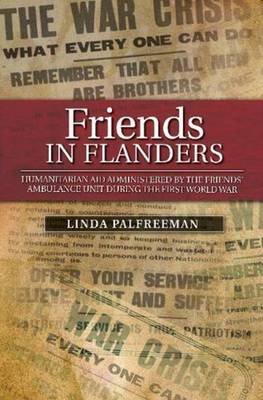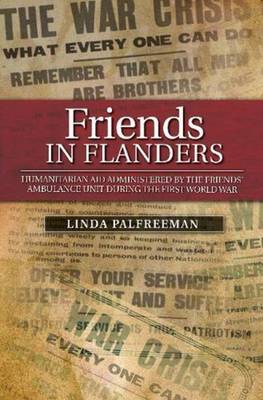
- Retrait gratuit dans votre magasin Club
- 7.000.000 titres dans notre catalogue
- Payer en toute sécurité
- Toujours un magasin près de chez vous
- Retrait gratuit dans votre magasin Club
- 7.000.0000 titres dans notre catalogue
- Payer en toute sécurité
- Toujours un magasin près de chez vous
Friends in Flanders
Humanitarian Aid Administered by the Friends' Ambulance Unit During the First World War
Linda Palfreeman
Livre broché | Anglais
84,95 €
+ 169 points
Description
The Friends' Ambulance Unit (FAU) was created shortly after the outbreak of war. The idea of the unit's founder, Philip J. Baker, was that it would provide young Friends (Quakers) with the opportunity to serve their country without sacrificing their pacifist principles. The first volunteers went to Belgium on 31 October 1914, under the auspices of the Joint War Committee of the British Red Cross Society and the Order of St John of Jerusalem. The FAU made a sustained contribution to the military medical services of the Allied nations, establishing military hospitals, running ambulance convoys, and staffing hospital ships and ambulance trains, treating and transporting wounded men. Determined to bring succour to all those in need, the FAU also assisted civilians trapped in the war zone and living in desperate circumstances. Nowhere was this more acute than in the besieged and battered town of Ypres where thousands sheltered in the underground passage-ways of the towns ancient fortifications -- a subterranean population, 'hopeless, often lightless, ' wrote Geoffrey Young, the Units young field commander, living on what they might and breeding disease. The Unit provided hospitals for the treatment of civilians, and worked intensively in the containment and treatment of the typhoid epidemic that swept the region, locating sufferers, providing them with medical care, and inoculating people against the disease. It played a major role in the purification of the town's contaminated drinking water, distributed milk for infants and food and clothing to the sick and needy. It helped found orphanages, made provision for schooling and organised gainful employment for refugees until, finally, it became responsible for the definitive evacuations of the civilian population.
Spécifications
Parties prenantes
- Auteur(s) :
- Editeur:
Contenu
- Nombre de pages :
- 200
- Langue:
- Anglais
Caractéristiques
- EAN:
- 9781845198718
- Date de parution :
- 31-05-17
- Format:
- Livre broché
- Format numérique:
- Trade paperback (VS)
- Dimensions :
- 152 mm x 229 mm
- Poids :
- 376 g

Les avis
Nous publions uniquement les avis qui respectent les conditions requises. Consultez nos conditions pour les avis.






